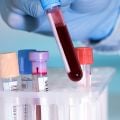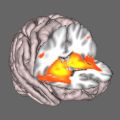
Image credit: John Cairns/ FMRIB
Oxford key to network of ultra-powerful MRI scanners
Researchers at Oxford University are playing a key role in expanding the UK's network of ultra-powerful MRI machines. Oxford and Nottingham Universities have been pioneering research using so-called 'Ultra-high field' (UHF) MRI scanners, which are at the cutting edge of biomedical imaging. They are now joined by new systems in Cardiff, Cambridge and Glasgow.
UHF MRI has the potential to provide unique insights into key medical conditions including dementia, cerebrovascular disease and mental health. Research is now focusing on taking the technology out of the lab and into hospital, with the UK poised to play a major role.
Using the standard measure of magnetic power, the Tesla, the machines are rated at 7 Tesla (7T). One Tesla is about 20,000 times the strength of Earth's magnetic field and medical MRI scanners are around 1.5 Tesla.
A £1.3 million grant from the Medical Research Council will help establish a UK7T Network –building on the existing 7T expertise at Nottingham and Oxford to make sure that the five sites use the same protocols to share and pool information easily, making it simpler to carry out clinical trials across various sites.
Dementia researchers and researchers in ageing, neurological and psychiatric disease and drug development will all benefit from the sharing of expertise within the partnership and the capacity for implementation of large and multi-site clinical trials. This ability will help maintain the UK's world-leading status in medical imaging research.
Dr Stuart Clare, who is leading the Oxford part of the network explained: 'Our scanner is very similar to those being installed at the new sites, so we're very much sharing what we've learnt and looking to build the network. A lot of this will be developing techniques and software, sending those to the other sites for them to use and receiving their developments to try here.
'We will also be linking with Dementias Platform UK. Oxford has strong expertise in dementia research and we're bringing that expertise to the work with DPUK.'
Stuart also explained that it is not just the UK7T team who will benefit from the programme. He said: 'Part of the aim is to enthuse the UK research community about what UHF MRI can do – people who don't have access to the scanners but might benefit from access to 7T imaging. We'll be going out and asking other scientists what we could do for them.'
 The Global Health Network reaches 1 million members
The Global Health Network reaches 1 million members
 First patients scanned in new study investigating traumatic brain injury in young athletes
First patients scanned in new study investigating traumatic brain injury in young athletes
 BMI, blood pressure and physical activity levels in childhood linked to brain differences
BMI, blood pressure and physical activity levels in childhood linked to brain differences
 Oxford researchers develop blood test to enable early detection of multiple cancers
Oxford researchers develop blood test to enable early detection of multiple cancers
 Professor James Binney awarded Royal Astronomical Society’s Gold Medal
Professor James Binney awarded Royal Astronomical Society’s Gold Medal
 MRI brain scans detect people with early Parkinson's
MRI brain scans detect people with early Parkinson's